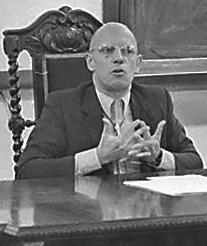Michel Foucault nejznámější citáty
Michel Foucault citáty a výroky
Zdroj: [Fischerová, Sylva, Rozhovor s Johnem Searlem, literarni.cz, 2012-07-29, 2012-10-05, http://www.literarni.cz/rubriky/rozhovory/za-intelektualni-kvalitu-neni-nahrada_9256.html]
Michel Foucault: Citáty anglicky
“On the Genealogy of Ethics: An Overview of Work in Progress.” Afterword, in Hubert L. Dreyfus and Paul Rabinow, Michel Foucault: Beyond Structuralism and Hermeneutics, 2nd ed. Chicago: University of Chicago Press. (1983)
Zdroj: Discipline and Punish (1977), Chapter One, The Spectacle of the Scaffold
Part Two: 2. The Transcendence of Delirium
History of Madness (1961)
Zdroj: Discipline and Punish (1977), Chapter Three, The Gentle Way in Punishment
"Friendship as a Way of Life," interview in Gai pied, April 1981, as translated in Ethics, Subjectivity and Truth (1994), pp. 135-136
Zdroj: Discipline and Punish (1977), Chapter One, The Spectacle of the Scaffold, pp.42
Zdroj: Discipline and Punish (1977), Chapter Three, The Gentle Way in Punishment
Lecture 1, January 10, 1979, p. 19
The Birth of Biopolitics (1978)
Il y a des moments dans la vie où la question de savoir si on peut penser autrement qu’on ne pense et percevoir autrement qu’on ne voit est indispensable pour continuer à regarder ou à réfléchir… Qu’est-ce donc que la philosophie aujourd’hui… si elle ne consiste pas, au lieu de légitimer ce qu’on sait déjà, à entreprendre de savoir comment et jusqu’où il serait possible de penser autrement ?… L’ « essai »—qu’il faut entendre comme épreuve modificatrice de soi-même dans le jeu de la vérité et non comme appropriation simplificatrice d’autrui à des fins de communication—est le corps vivant de la philosophie, si du moins celle-ci est encore maintenant ce qu’elle était autrefois, c’est-à-dire une « ascèse », un exercice de soi, dans la pensée.
Vol. II : L’usage des plaisirs p. 15-16.
History of Sexuality (1976–1984)
Part One: 5. The Insane
History of Madness (1961)
Las Menias
The Order of Things: An Archaeology of the Human Sciences (1970)
Les discours sont des éléments ou des blocs tactiques dans le champ des rapports de force; il peut y en avoir de différents et même de contradictoires à l'intérieur d'une même stratégie; ils peuvent au contraire circuler sans changer de forme entre des stratégies opposées.
Vol I, pp. 101-102
History of Sexuality (1976–1984)
Vol. I, p. 60
History of Sexuality (1976–1984)
Part Three, The Means of Correct Training
Discipline and Punish (1977)
Preface to 1961 edition
History of Madness (1961)
Zdroj: Discipline and Punish (1977), Chapter One, The Spectacle of the Scaffold
Kontext: The public execution, then, has a juridico-political function. It is a ceremonial by which a momentarily injured sovereignty is reconstituted. It restores that sovereignty by manifesting it at its most spectacular. The public execution, however hasty and everyday, belongs to a whole series of great rituals in which power is eclipsed and restored (coronation, entry of the king into a conquered city, the submission of rebellious subjects); over and above the crime that has placed the sovereign in contempt, it deploys before all eyes an invincible force. Its aim is not so much to re-establish a balance as to bring into play, as its extreme point, the dissymmetry between the subject who has dared to violate the law and the all-powerful sovereign who displays his strength.
Zdroj: Lectures on the Will to Know (1970), p. 4
Las Menias
The Order of Things: An Archaeology of the Human Sciences (1970)
Discourse on Language, Inaugural Lecture at the Collège de France, 1970-1971. tr. A. M. Sheridan Smith
Part Two: 2. The Transcendence of Delirium
History of Madness (1961)
“Practicing criticism, or, is it really important to think?”, interview by Didier Eribon, May 30-31, 1981, in Politics, Philosophy, Culture, ed. L. Kriztman (1988), p. 155
Part Four, Complete and austere institutions
Discipline and Punish (1977)
Quand j’étudie les mécanismes de pouvoir, j’essaie d’étudier leur spécificité… Je n’admets ni la notion de maîtrise ni l’universalité de la loi. Au contraire, je m’attache à saisir des mécanismes d’exercise effectif de pouvoir ; et je le fais parce que ceux qui sont insérés dans ces relations de pouvoir, qui y sont impliqués peuvent, dans leurs actions, dans leur résistance et leur rébellion, leur échapper, les transformer, bref, ne plus être soumis. Et si je ne dis pas ce qu’il faut faire, ce n’est pas parce que je crois qu’il n’y a rien à faire. Bien au contraire, je pense qu’il y a mille choses à faire, à inventer, à forger par ceux qui, reconnaissant les relations de pouvoir dans lesquelles ils sont impliqués, ont décidé de leur résister ou de leur échapper. De ce point de vue, toute ma recherche repose sur un postulat d’optimisme absolu. Je n’effectue pas mes analyses pour dire : voilà comment sont les choses, vous êtes piégés. Je ne dis ces choses que dans la mesure où je considère que cela permet de les transformer. Tout ce que je fais, je le fais pour que cela serve.
Dits et Écrits 1954–1988 (1976) Vol. II, 1976–1988 edited by Daniel Defert and François Ewald, p. 911-912
